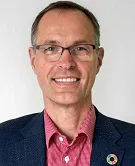700 products and over 200,000 producers in more than 135 countries fall under a GLOBALG.A.P. certification. Dr. Kristian Moeller has been part of the management of FoodPLUS Ltd, the company behind the standard, since its foundation 20 years ago. He talked to us about GLOBALG.A.P.'s past successes and future goals.
How many producers are GLOBALG.A.P. certified in Germany?
Kristian Moel ler: "In Germany, we have a total of 5,425 producers who are GLOBALG.A.P. certified. They are primarily active in the fruit and vegetable sector, but also in horticulture for flowers and ornamental plants. Part of this group is also certified through the gebenchmarked QS-GAP system. Here, the top 3 products in terms of the number of certified farms in Germany are potatoes, cherries and plums."
ler: "In Germany, we have a total of 5,425 producers who are GLOBALG.A.P. certified. They are primarily active in the fruit and vegetable sector, but also in horticulture for flowers and ornamental plants. Part of this group is also certified through the gebenchmarked QS-GAP system. Here, the top 3 products in terms of the number of certified farms in Germany are potatoes, cherries and plums."
What trends have you been able to observe, or even follow?
"The very big issue is that after 20 years of certifying fruit and vegetable producers, we are moving from B2B (business to business) to B2C (business to customer). Recently, our B2C label was launched in Portugal. The Chain of Custody standards, as well as the GRASP program, again together form a major issue for the Supply Chain Act. However, it is also important for us to look more into the issues of biodiversity and water supply/use, which will allow us to work more holistically. In addition, we are developing our IT system to be able to reduce costs for growers as well."
What hurdles do you think still exist?
"Digitalization is not an insurmountable hurdle at GLOBALG.A.P. per se. However, we are trying to build trust in digital communication across the supply chain. The biggest hurdle is to efficiently collect meaningful information about production processes, store it in confidence, and share it with the consent of the owners of the data, if necessary, so that we can subsequently prove the effectiveness of our standards in the markets."
In which countries is it particularly difficult to carry out GLOBALG.A.P. certifications?
"It is very difficult in countries where the basic infrastructure for fresh produce is lacking or where the produce basically cannot be delivered. In the absence of neutral control and a lack of trust in the rule of law, certification organized by the private sector is a challenge. There are also countries where auditors - apart from Corona - may be at risk. These are, for example, countries where there are active criminal structures. But there can also be complications in centrally governed countries in part because of the lack of independence of state powers, for example."
What do you think will be the biggest challenges in the future?
"Climate change, biodiversity and social justice are our three big issues. Along with that, measures need to be created to enable fair shared value principles in the supply chain. And not just for today, but also for the next generations. In doing so, we must also try to ensure that the cost of certifications remains fair. Our big vision is to enable growers to document and prove their contribution to the United Nations Sustainable Development Goals, the SDGs, in such a credible way that they then ultimately get credit for it."
But won't this put businesses at a disadvantage that don't have the opportunity to get certified?
"We try to work with organization like GIZ or USAID to find programs for all farms to help them get appropriate training, funding, investment. We allow producers to supply to a large market, that is global, which also creates new opportunities. We translate consumer demands in the markets into good agricultural practices. This provides uniformity, which serves to provide better guidance. That alone triggers a lot of national investment."
What do you think about the Supply Chain Act?
"I think it's basically good that society should take more responsibility, especially that it's standardized and not just on the backs of importers. Private sector standards should clarify this traceability. But the problem is that some business models don't allow for it. Responsible buyers and companies are getting it right. Change will come through more transparency and data sharing. We have the structures in place in the fruit & vegetable and flower industry. My personal opinion - not that of the organization - is that we need decoupling of prices. There is the quantity- and quality-based market price that must result so that there is no waste. This means that for activities that promote social aspects, climate protection, bio-diversity, etc., I can remunerate society via a different way. For this, we need a smart and sustainable product mechanism."
For more information:
Dr. Kristian Moeller
FoodPLUS GmbH
Spichernstraße 55
50672 Köln
Tel: +49 221 57776 -0
Fax: +49 221 57776 -1999
Web: www.globalgap.org
E-Mail: info@globalgap.org
